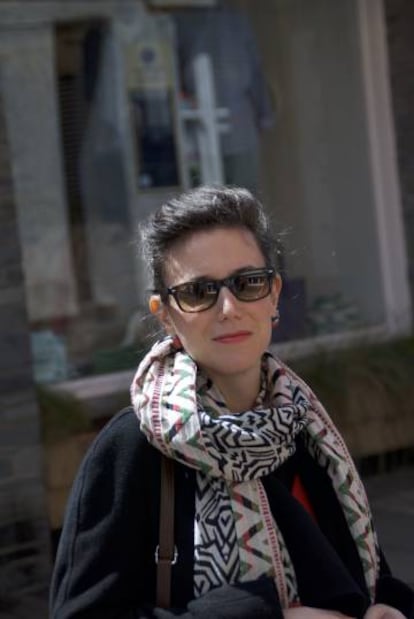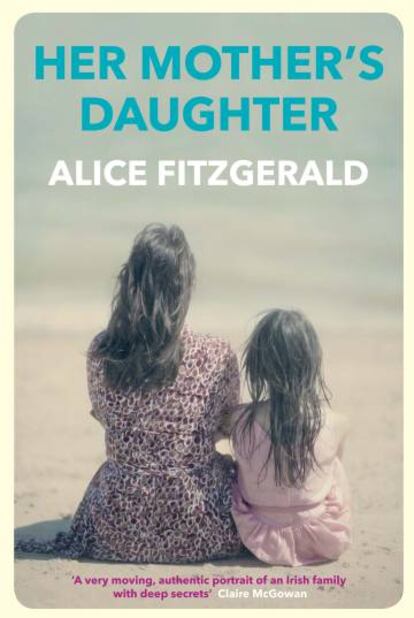“I think you need therapy to help you escape turning into your parents”
Madrid-based writer Alice Fitzgerald explores the impact of warped inter-generational relationships in her debut novel, ‘Her Mother’s Daughter’

Former Hello! magazine writer Alice Fitzgerald has stopped producing upbeat stories of lavish weddings and stately homes and gone over to the dark side. After eight years of writing and rewriting, she has just published her first novel, Her Mother’s Daughter, a story that embraces the sentiment of Philip Larkin’s most famous poem, This Be The Verse, which begins with the line, “They fuck you up, your mum and dad.”
Written under a pen name, the novel moves between London and Ireland and revolves around the lives of an Irish emigrant family and incestuous abuse that torments the mother Josephine with insidious repercussions on her young daughter Claire.
“I was surprised but it is a page turner,” says Alice. “A lot of people have said they read it in one sitting.”
Now a mother herself, Alice talks to EL PAÍS about escaping the inevitability of turning into our parents.
Question. How does it feel to be a published author?
Answer. I was saying to someone yesterday, getting published is the biggest dream and then you do it and it’s like, OK, what’s next? That’s why, it’s not the destination, but the journey that counts, and that involves rethinking and re-education. I’m getting better at it. Comparison is where the evil lies.
She can’t face up to herself because she can’t get over the guilt of the rape and her own mother’s insinuations
Q. Using an alias must have been a difficult decision?
A. It’s annoying and I will always wonder if I made the right decision. When I saw the book cover, I really missed out on a bit of excitement from not seeing my own name, but close to publication, I got nervous about the assumption the novel was a memoir, which it isn’t. Using another name just puts a bit of distance between me and the story and it has also offered a degree of self-preservation. I’ve received some amazing reviews and a few that are not so amazing and those ones hurt. Having Alice Fitzgerald as the author instead of myself creates a bit of a barrier.
Q. Hello! is such a determinedly positive publication and your book is quite dark. How did you cope with restricting yourself to the banal?
A. I don’t think you can always be writing deep, taxing material. It takes a lot of energy and a lot of creativity. So if you’re writing for a living, it needs to be easy – something that doesn’t take much brain space.
Q. The novel deals with the inevitability of turning into our parents. Can we escape this fate?

A. I think you have to work really hard to escape it. I think you need therapy to help you. Most people at some point in their life would hugely benefit from it. But I think we are all the results of our parents in the end.
Q. Tell us a bit about the Irish community in London when you were growing up.
A. There were always lots of dances and there was a dance hall that stayed open for years in Cricklewood called the Galtymore that Irish emigrants would go to. It closed in 2008, but it’s where I went in the early Noughties. There was a part for the adults and a part for the kids separated by a door and we’d go through it and there’d be all the Irish tunes. At our school, there were lots of kids with Irish parents. They all went to Mass and did the Holy Communion, you know the whole Catholic thing. I really emphasized the religious side of life in the book. I’m intrigued by religion and Catholicism and sexual abuse that went on within the community. I find the whole idea of God coming to save you fascinating. I’ve actually written a poem about the Basílica de Jesús de Medinaceli, a church here in Madrid in the Barrio de Las Letras where people go up the stairs on their knees to touch the feet of a statue of Jesus after queuing for hours or even days.
Q. The story is shocking because it’s the mother who is unpredictable, not the father.
A. A mother is so sacred. A lot of people’s experience of a mother is of this wonderful warm person, the one person you can count on. So seeing that role as the source of fear isn’t something that is spoken about much.
Q. Nowadays, we’re fighting for more paternity leave and a more gender-equal society. Do you think the mother and father’s role will become interchangeable and we will eventually stop thinking of the mother in this way?
A. I think there needs to be more respect for the father’s role. It seems to be quite often overlooked. Obviously it’s the woman who carries the baby and gives birth and you can’t ever change that. It’s a beautiful thing and it marks a fundamentally different relationship at the beginning, but I thinks it’s really great that men get six weeks paternity now. It means they aren’t just reduced to looking on. Men and women are becoming more androgynous, for better and worse. The overlapping of roles can be difficult. It’s positive that women have careers and men are more in touch with their children but at the same time we’re all trying to be everything. Previously, different figures in a community answered different needs and we didn’t demand so much of one person.
Q. Josephine becomes increasingly unhinged as the book progresses. Is that a result of motherhood?
A. Children are unpredictable and that exacerbates issues she’s struggled with. It all gets too much for her. When it says, “The dog wants another bit of me,” it’s like she’s being pulled in different directions and doesn’t have any more to give. She can’t face up to herself because she can’t get over the guilt of the rape and her own mother’s insinuations. In our society, guilt is everywhere. The more choices we have the more tormented we are. Advertising, marketing, you can’t get away from it. Those ads that say, ‘just like your mum makes!’ seem designed to make you feel guilty, beautiful faces, guilty, skinny bodies, guilty. We are even told to buy a product so our vaginas don’t smell. It’s absolutely insane.
Q. What next?
A. I am already well into the next novel. It is inspired by my grandmother, who emigrated from Ireland to America when she was 18 and she got engaged. When she returned to Ireland to tell her parents, she never went back to the US and her fiancé came to find her 20 years later.
Her Mother’s Daughter by Alice Fitzgerald is available on Amazon.
Tu suscripción se está usando en otro dispositivo
¿Quieres añadir otro usuario a tu suscripción?
Si continúas leyendo en este dispositivo, no se podrá leer en el otro.
FlechaTu suscripción se está usando en otro dispositivo y solo puedes acceder a EL PAÍS desde un dispositivo a la vez.
Si quieres compartir tu cuenta, cambia tu suscripción a la modalidad Premium, así podrás añadir otro usuario. Cada uno accederá con su propia cuenta de email, lo que os permitirá personalizar vuestra experiencia en EL PAÍS.
¿Tienes una suscripción de empresa? Accede aquí para contratar más cuentas.
En el caso de no saber quién está usando tu cuenta, te recomendamos cambiar tu contraseña aquí.
Si decides continuar compartiendo tu cuenta, este mensaje se mostrará en tu dispositivo y en el de la otra persona que está usando tu cuenta de forma indefinida, afectando a tu experiencia de lectura. Puedes consultar aquí los términos y condiciones de la suscripción digital.








































